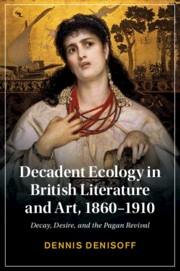Book contents
- Decadent Ecology In British Literature And Art, 1860–1910
- Cambridge Studies in Nineteenth-Century Literature and Culture
- Decadent Ecology In British Literature And Art, 1860–1910
- Copyright page
- Contents
- Figures
- Acknowledgments
- Introduction
- Chapter 1 Decadent Ecology and the Pagan Revival
- Chapter 2 “Up & down & horribly natural”
- Chapter 3 The Lick of Love
- Chapter 4 The Genius Loci as Spirited Vagabond in Robert Louis Stevenson and Vernon Lee
- Chapter 5 Occult Ecology and the Decadent Feminism of Moina Mathers and Florence Farr
- Chapter 6 Sinking Feeling
- Epilogue
- Notes
- Index
- Cambridge Studies in Nineteenth-Century Literature and Culture
Chapter 2 - “Up & down & horribly natural”
Walter Pater and the Decadent Anthropocene
Published online by Cambridge University Press: 09 December 2021
- Decadent Ecology In British Literature And Art, 1860–1910
- Cambridge Studies in Nineteenth-Century Literature and Culture
- Decadent Ecology In British Literature And Art, 1860–1910
- Copyright page
- Contents
- Figures
- Acknowledgments
- Introduction
- Chapter 1 Decadent Ecology and the Pagan Revival
- Chapter 2 “Up & down & horribly natural”
- Chapter 3 The Lick of Love
- Chapter 4 The Genius Loci as Spirited Vagabond in Robert Louis Stevenson and Vernon Lee
- Chapter 5 Occult Ecology and the Decadent Feminism of Moina Mathers and Florence Farr
- Chapter 6 Sinking Feeling
- Epilogue
- Notes
- Index
- Cambridge Studies in Nineteenth-Century Literature and Culture
Summary
In Chapter 2, I explore Walter Pater’s turn to Classical paganism to formulate his vision of the individual subject as dissipated through a range of spaciotemporal landscapes. Situating Pater’s Studies in the History of the Renaissance (1873) and Marius the Epicurean (1885) within the context of scientific claims by Charles Darwin, Ernst Haeckel, and Antonio Stoppani, the chapter articulates the way in which Pater’s paganism melds the Classical with recent scientific developments to present a sympathetic fusion of humans, other animals, plants, atmosphere, landscape, cultures, and even architecture. In the process, the chapter also address the ways in whih people such as Stoppani turned to metaphors and methods of comprehension rooted in Classical mythology to formulate, in his case, a pseudo-scientific, Christian conception of the rise of the Anthropocene.
- Type
- Chapter
- Information
- Decadent Ecology in British Literature and Art, 1860–1910Decay, Desire, and the Pagan Revival, pp. 34 - 60Publisher: Cambridge University PressPrint publication year: 2021

